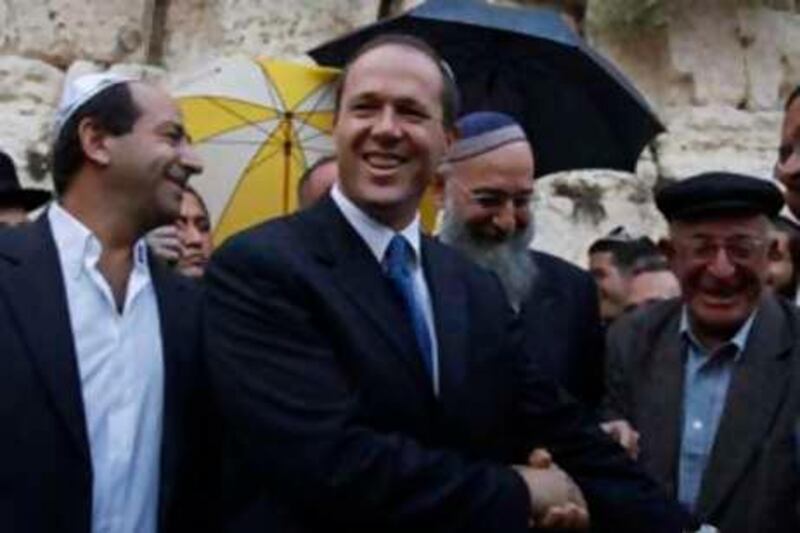JERUSALEM // Israelis called it the secular revolution. In a victory ending five years of ultra-Orthodox rule in Jerusalem, Nir Barkat, a secular self-made millionaire and venture capitalist, was elected as the holy city's mayor with 52 per cent of the vote. His main challenger, the ultra-Orthodox Rabbi Meir Porush, trailed with 43 per cent of support, while two other candidates garnered a total of less than five per cent. The election reflected an intense battle between secular and ultra-Orthodox Jerusalemites over the Jewish character of the city. Mr Barkat, 49, lost his first mayoral bid in 2003 to Uri Lupolianski, who became the city's first ultra-Orthodox mayor and appointed ultra-Orthodox rabbis to four out of five deputy mayoral positions. Mr Lupolianski's victory fuelled complaints by secular Jerusalemites about City Hall's favouritism towards the ultra-Orthodox in such areas as housing, transportation and education. That concern, coupled with a dearth of jobs and affordable housing, has contributed to an exodus of secular and educated Jerusalemites from the city in recent years that has dealt a heavy blow to Jerusalem's economy. The election highlighted not only divisions among the secular and religious, but also between Jerusalem's Arabs and Jews. Jerusalem's 260,000 Palestinian residents typically do not vote in mayoral elections because that would show their recognition of Israel's sovereignty over the entire city. Israel took over East Jerusalem during the 1967 war and later annexed it in a move not recognised internationally. Palestinians view the eastern part of the holy city as the capital of their future state. But the Palestinians' refusal to vote also leaves them with little influence at City Hall. The municipality provides only a tenth of its budget to Palestinian Jerusalemites, despite the fact that they account for a third of the city's population. Indeed, East Jerusalem is in desperate need of improvement - two thirds of its Arab families live below the poverty line, many streets have no sidewalks, roads are potholed and strewn with rubbish, and schools are acutely short of classrooms. Mr Barkat, like his rival Mr Porush, led a hardline rightist campaign that stressed his opposition to Israel making any territorial concessions in Jerusalem to the Palestinians as part of a future peace agreement. Speaking to supporters in his predawn victory speech that appeared to ignore Jerusalem's Palestinian residents, Mr Barkat said "tonight Jerusalem has won, tonight Israel has won, tonight the Jewish people have won. The victory belongs to all those who love and appreciate our incredible city, the eternal capital of the Jewish people." Mr Barkat is not shy about expressing his hardline stance. Last year, he quit the centrist Kadima party of Ehud Olmert, the outgoing prime minister, because he opposed the inclusion of Jerusalem's future status - and its possible division into Israeli and Palestinian capitals - in talks with the Palestinians. Today, he also criticised a speech by Mr Olmert earlier in the week in which the Israeli leader called for the Jewish state to give up large tracts of land in the West Bank - including in Arab East Jerusalem - in exchange for peace. Mr Barkat told journalists that the statements "were a grave mistake", especially because they were made by an outgoing prime minister. Mr Olmert resigned in September amid corruption investigations and will leave his post after national elections in February. While Jerusalem's mayor has no say in talks over Jerusalem's future, he could influence the delicate relations between Jewish and Palestinian residents. Some left-wing Jerusalem politicians have expressed worry about Mr Barkat's campaign statements, which supported the building of Jewish settlements in the city's Palestinian neighbourhoods and an increased involvement by Israel in the management of Islamic holy sites. Whatever his political views are, Mr Barkat's main asset was his secular identity. The bulk of his support came from secular and modern Orthodox Jerusalemites bitter about what they view as the growing ultra-Orthodox control over the city. Ultra-Orthodox Jews lead a stringent lifestyle that focuses on the study of holy texts and they follow a strict dress code - men wear dark suits and black, wide-brimmed hats and women don long skirts and long-sleeved shirts. The campaigns reflected the tensions among Jerusalem's Jews. In statements that were later used by his secular rivals in their campaign ads, Mr Porush last week drew heavy criticism for telling a closed gathering in Yiddish - the language many ultra-Orthodox prefer to speak among themselves - that within 10 years there will not be a secular mayor anywhere in Israel. "His statement was a turning point," commentator Shalom Yerushalmi wrote in the Israel Hayom daily. "The secular public was encouraged to go out and vote because it understood that it's about to be expelled from the city." Anger towards the ultra-Orthodox was also driven by some recent events. The most striking example was a ceremony in June marking the opening of a new bridge, when the secular public was outraged after an ultra-Orthodox deputy mayor forced a teenage girls' dance troupe to cover their bodies with long, brown frocks that came to their ankles and their hair with tight black caps to avoid offending religious viewers. The physical differences between Mr Barkat and Mr Porush were also emblematic of the fight for Jerusalem - Mr Barkat with his clean-shaven face and Mr Porush, a 53-year-old father of 12, with his flowing white beard. Mr Porush himself appealed to secular voters not to judge him by his beard. "Barkat supporters relayed a message yesterday - our city has no beard," wrote Shahar Ilan in the left-wing Haaretz newspaper yesterday. "More than anything, the elections were about the character of the city, and Jerusalem residents chose a city that shaves." vbekker@thenational.ae
Barkat becomes Jerusalem's mayor
In a victory ending five years of ultra-Orthodox rule in Jerusalem, Nir Barkat is elected as the new mayor.

More from the national




